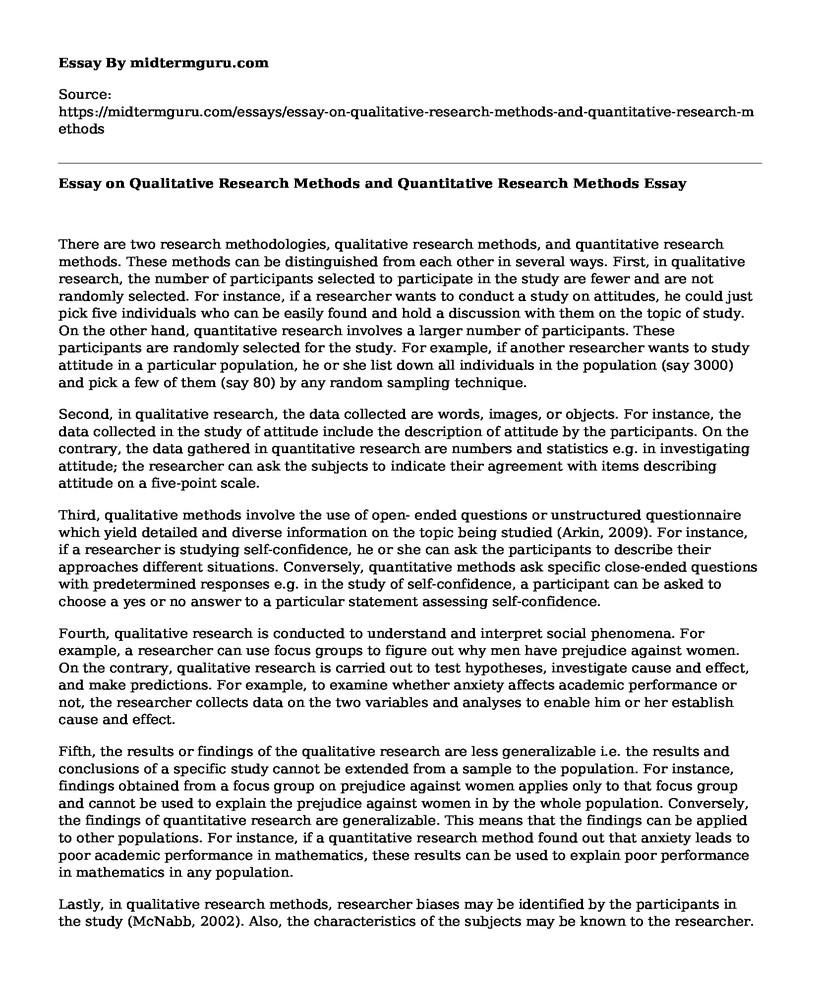There are two research methodologies, qualitative research methods, and quantitative research methods. These methods can be distinguished from each other in several ways. First, in qualitative research, the number of participants selected to participate in the study are fewer and are not randomly selected. For instance, if a researcher wants to conduct a study on attitudes, he could just pick five individuals who can be easily found and hold a discussion with them on the topic of study. On the other hand, quantitative research involves a larger number of participants. These participants are randomly selected for the study. For example, if another researcher wants to study attitude in a particular population, he or she list down all individuals in the population (say 3000) and pick a few of them (say 80) by any random sampling technique.
Second, in qualitative research, the data collected are words, images, or objects. For instance, the data collected in the study of attitude include the description of attitude by the participants. On the contrary, the data gathered in quantitative research are numbers and statistics e.g. in investigating attitude; the researcher can ask the subjects to indicate their agreement with items describing attitude on a five-point scale.
Third, qualitative methods involve the use of open- ended questions or unstructured questionnaire which yield detailed and diverse information on the topic being studied (Arkin, 2009). For instance, if a researcher is studying self-confidence, he or she can ask the participants to describe their approaches different situations. Conversely, quantitative methods ask specific close-ended questions with predetermined responses e.g. in the study of self-confidence, a participant can be asked to choose a yes or no answer to a particular statement assessing self-confidence.
Fourth, qualitative research is conducted to understand and interpret social phenomena. For example, a researcher can use focus groups to figure out why men have prejudice against women. On the contrary, qualitative research is carried out to test hypotheses, investigate cause and effect, and make predictions. For example, to examine whether anxiety affects academic performance or not, the researcher collects data on the two variables and analyses to enable him or her establish cause and effect.
Fifth, the results or findings of the qualitative research are less generalizable i.e. the results and conclusions of a specific study cannot be extended from a sample to the population. For instance, findings obtained from a focus group on prejudice against women applies only to that focus group and cannot be used to explain the prejudice against women in by the whole population. Conversely, the findings of quantitative research are generalizable. This means that the findings can be applied to other populations. For instance, if a quantitative research method found out that anxiety leads to poor academic performance in mathematics, these results can be used to explain poor performance in mathematics in any population.
Lastly, in qualitative research methods, researcher biases may be identified by the participants in the study (McNabb, 2002). Also, the characteristics of the subjects may be known to the researcher. On the other hand, researcher and his or her biases are not known by subjects in quantitative methods. Additionally, the characteristics of the subjects are not known by the investigator. For instance, in any quantitative study, the participants are given unique codes for identification and not their real names. The use of codes is important in maintaining confidentiality and anonymity.
References
Arkin, E. B. (2009). Making Health Communication Programs Work (rev. Ed. ). DIANE Publishing.
McNabb, D. E. (2002). Research Methods in Public Administration and Nonprofit Management. M.E. Sharpe.
Cite this page
Essay on Qualitative Research Methods and Quantitative Research Methods. (2021, May 26). Retrieved from https://midtermguru.com/essays/essay-on-qualitative-research-methods-and-quantitative-research-methods
If you are the original author of this essay and no longer wish to have it published on the midtermguru.com website, please click below to request its removal:
- Example of a Paper on Statistical Techniques
- Paper Sample With Questions on Statistics: P-Value and Statistical Hypothesis
- Oman Telecommunications Company: SWOT Analysis
- Analysis of Internal and External Environment of a Company - Paper Example
- Statistics Paper Example on Female Headed Households in Indonesia
- Essay Sample on Validity in Quantitative Research and Designs
- Great Start Nutrition: A Century of Growth and Expansion - Essay Sample







